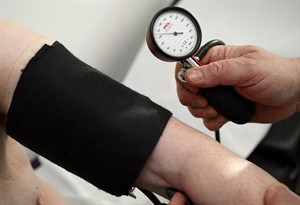
A doctor takes the blood pressure of a man in Stuttgart, Germany, Feb.6, 2009. A large Canadian-led study shows that less than half of people with high blood pressure are aware of the fact. The international study also shows that while most people with hypertension are on medication, only about one-third of them are successfully managing the condition.
(THE CANADIAN PRESS/AP/THOMAS KIENZLE / iNFOnews.ca)
September 03, 2013 - 8:17 PM
TORONTO - A large Canadian-led study shows that even though the risks posed by high blood pressure are well known, the condition remains under-diagnosed and poorly controlled around the world.
The study, which was conducted in 17 countries, showed that 41 per cent of adults tested had high blood pressure.
But just under half of those people were aware they had the problem.
Of those who knew they had hypertension, 88 per cent were receiving some drug therapy for the condition.
But only about one-third of the people taking medication had their blood pressure under control.
The new president of the World Hypertension League says the findings are evidence of a widespread failure to address hypertension prevention and control.
"There's a recognition that this needs to be dealt with," said Dr. Norm Campbell, a professor of medicine at the University of Calgary who has been a leader of Canadian efforts to combat hypertension.
"We need very, very strong government leadership, both for prevention but for also evolution of our health-care system."
Campbell was not involved in this study, which was led by researchers at McMaster University in Hamilton, Ont. The study was published Tuesday in the Journal of the American Medical Association.
The findings come from the PURE study — the acronym stands for Prospective Urban Rural Epidemiology — which is designed to track how urbanization is affecting risk factors for and rates of cardiovascular disease in various parts of the world.
The 17 countries in the study represent a mixture of upper income, developing and low income nations.
People with hypertension in higher income countries were more likely to be aware of their condition than people in lower income countries. The same was true for the likelihood that a person with high blood pressure would be treated.
Dr. Koon Teo, a cardiologist and epidemiologist, is one of the co-lead authors of the paper. He says the findings aren't surprising, but point to the need for much more work in the field of blood pressure control.
"Lots of people don't know they have hypertension. And even those who know about their hypertension, a proportion did not receive treatment. And of those who received treatment, blood pressure is not well controlled," Teo said.
Campbell suggested the tragedy of hypertension — a leading cause of death and disability worldwide — is that it is largely preventable.
"If we look back to hunter-gatherer societies, which are almost non-existent now, they might have had five per cent of the population hypertensive, with very little increase of blood pressure with age," said Campbell, who began his term as head of the World Hypertension League on Tuesday.
"So this is really something that we've done to our society by becoming physically inactive, obese and eating highly processed foods with lots of salt, low potassium, low fibre, etc."
Campbell said the study shows that he has his work cut out for him.
News from © The Canadian Press , 2013